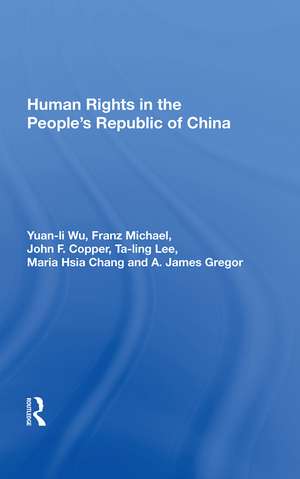Human Rights In The People's Republic Of China
Autor Yuan Li Wuen Limba Engleză Hardback – 23 mai 2019
Preț: 764.20 lei
Preț vechi: 1027.40 lei
-26% Nou
Puncte Express: 1146
Preț estimativ în valută:
146.25€ • 152.49$ • 121.54£
146.25€ • 152.49$ • 121.54£
Carte tipărită la comandă
Livrare economică 20 martie-03 aprilie
Preluare comenzi: 021 569.72.76
Specificații
ISBN-13: 9780367014131
ISBN-10: 0367014130
Pagini: 344
Dimensiuni: 152 x 229 mm
Greutate: 0.45 kg
Ediția:1
Editura: Taylor & Francis
Colecția Routledge
Locul publicării:Oxford, United Kingdom
ISBN-10: 0367014130
Pagini: 344
Dimensiuni: 152 x 229 mm
Greutate: 0.45 kg
Ediția:1
Editura: Taylor & Francis
Colecția Routledge
Locul publicării:Oxford, United Kingdom
Cuprins
Preface -- Introduction: An Overview -- Human Rights and the Establishment of Nationwide Control -- Defining Human Rights in the People’s Republic of China -- Building a Network of Controls: A Chronological Outline -- The PRC System from 1949 to 1984 -- Law: A Tool of Power -- Human Rights and the Chinese Political System -- The Economy: An Object of Experimentation -- Ideology, Reality, and Human Rights -- The Victim Groups -- Counterrevolutionaries -- Victims by Economic Category: Farmers, Businesspeople, and Workers -- Intellectuals and “Democratic Elements”: A Distmsted Underclass -- Red Guards and Political Dissidents (I): Tools of Violence and Power Struggle -- Red Guards and Political Dissidents (II): Victims Beyond a Generation -- Factions -- Women -- Non-Chinese Nationalities and Religious Communities -- Conclusion -- Let the Record Speak for Itself -- A Statistical Analysis of Judicial Practice and the Human Rights Condition in the People’s Republic of China -- A 1979 Chinese Declaration of Human Rights
Descriere
This book examines the effects that political institutions, the legal system, and economic policies have had on the human rights record in the PRC since 1949. The authors first address the problems of assessing political liberties in a nation that emphasizes economic over civil rights and that has traditionally valued collective rights over individual freedom. In later chapters the authors describe how various “target groups”–intellectuals, youth groups, women, and religious and racial minorities–have fared under communist leadership. Also included is a statistical analysis of the record of the PRC’s judicial system, based on 38,000 cases of arrests, detentions, and sentences reported in the Chinese press. The authors assert that human rights violations were more serious during the Cultural Revolution than at any other time in recent history, although the situation did not receive much attention in the world press or among human rights advocates. The documents show that in recent years the human rights record has improved somewhat, but the authors conclude that current trends are most discouraging.
